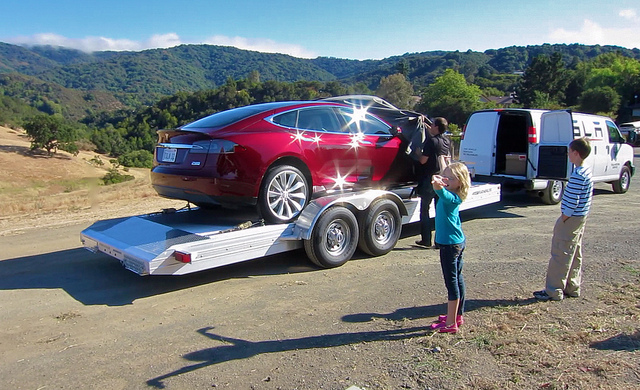
Suburbanites Accidentally Go Green
By Tetra Balestri, Student Contributor
Postdoctoral researcher Stephen Locke grew up in Kentucky driving muscle cars. “I come from a race car family,” he said. In his hometown, the Ford Mustang GT and the Chevrolet Camaro SS would have been respectable vehicles. Locke admitted, “No one in my family would ever drive your typical hybrid or electric vehicle.” That was, until, the advent of the Tesla Roadster: the first all-electric luxury sports car.
In the new study, “Accidental Environmentalists? Californian Demand for Teslas and Solar Panels,” Locke collaborated with Institute of the Environment and Sustainability professors Magali Delmas and Matthew E. Kahn to investigate the purchasing power of the Tesla. Their research focuses on how quality and cost efficiency of electric vehicles (EV) and solar panels is affecting suburban consumers and ultimately, the environment.
“Most consumers are driven by private benefits when making decisions.” Delmas explained. As eco-friendly products become more competitive in quality and price, they are more appealing to the consumer.
Indeed, the Tesla is a benchmark for quality. Its acceleration speed, technological innovation, and status are among the top reasons drivers purchase these luxury cars. Reducing carbon emissions is not necessarily on the consumers’ minds.
“Tesla is a phenomenon,” Delmas stated, “The product gains a lot of enthusiasm and has a lower impact on the environment.” Tesla buyers are not your typical “greenies.” They are “accidental environmentalists” who just happen to be making decisions that benefit the planet.
As it turns out, these decisions extend beyond car purchases. Tesla owners are also buying solar panels to offset electric fueling prices in what is now considered a bundle package. “You see a positive correlation between the adoption of electric and hybrid vehicles and solar panels,” said Locke.
Close to 50 percent of EV owners either have solar panels or plan to install them within the next year. Because of new financing options, such as leasing and zero money down, solar panels have become more attractive to many consumers, not just electric and hybrid car vehicles owners.
Once again, it is not the green liberals who are buying the solar panels. “It is actually the opposite” said Delmas. The significant factors are household size, ownership, and proximity to city centers. In other words: a suburban homeowner.
This research offers a message of hope to suburbanites. If the trend continues, suburban residents, who are traditionally high energy consumers, could drastically reduce their greenhouse gas emissions. As products improve and prices become more competitive, living in the suburbs might just become an enticing, environmentally-smart decision.
